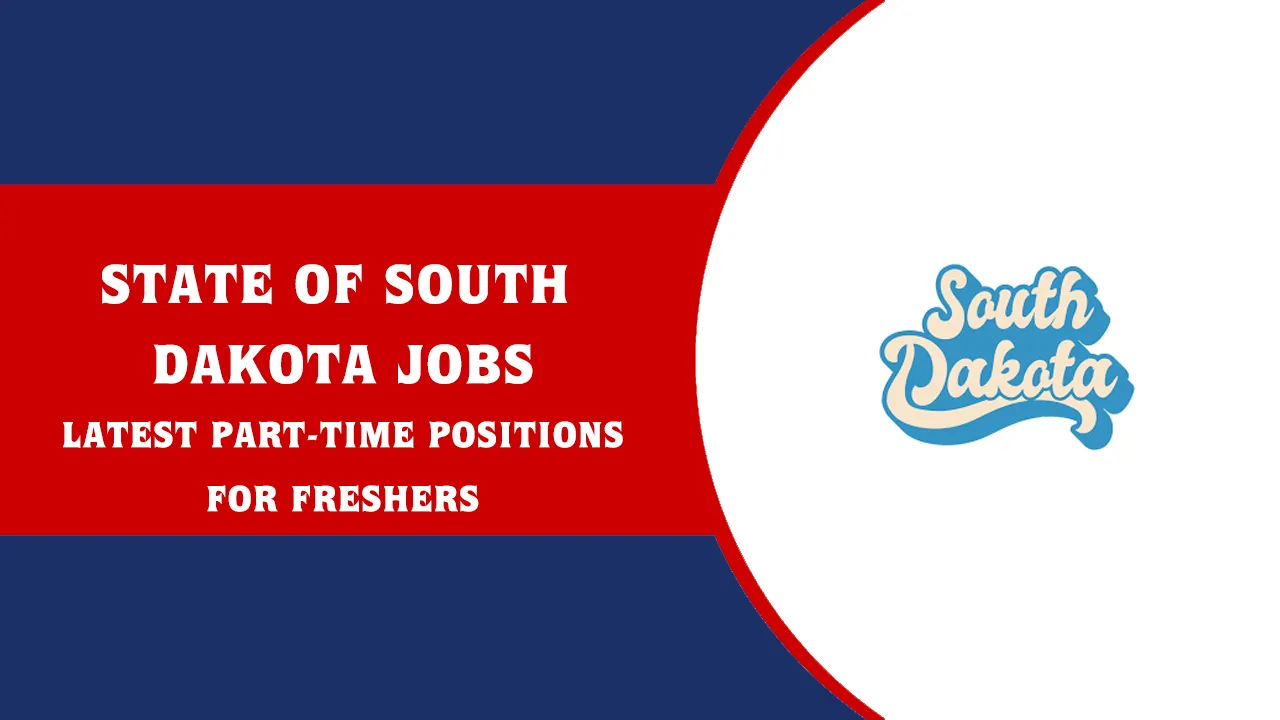Ever thought about waking up every day knowing that your work actually makes life better for others? If so, you’ll find that purpose with the State of South Dakota Jobs. Starting a career in the state might just be one of the most logical decisions for anyone seeking stability, growth, and a better quality of life. Known for its natural beauty, welcoming communities, and strong work ethic, the state offers more than just a pleasant lifestyle. It offers an environment where career potential is balanced with personal well-being.
The job market in South Dakota remains stable, largely due to its strong economy and well-maintained public infrastructure. Those seeking careers that offer long-term growth, excellent benefits, and a chance to make a difference often find what they need here. Whether someone is interested in education, healthcare, infrastructure, or the public service, the options are wide-ranging and accessible. The appeal goes beyond just employment. So why just think about it when you can go for it right now? Submit your application and make it count.
For More Latest Government Jobs: Click Here
| Company Name: | State of South Dakota |
| Job Locations: | United States |
| Last Updated on: | August 15th, 2025 |
State of South Dakota Jobs in USA 2025 | Current Job Opportunities

About South Dakota
South Dakota is located in the heart of the northern plains. It is a state defined by open skies, strong values, and a sense of possibility that appeals to both residents and newcomers. It is bordered by six other states, yet maintains its own identity influenced by its history, geography, and people. The state is home to landmarks like Mount Rushmore, the Black Hills, and the Missouri River and offers an impressive backdrop to daily life. But it is more than just scenery.
South Dakota is built on community-centered ideals, where neighbors know each other and where the pace of life allows people to slow down and focus on what matters. Cities like Sioux Falls and Rapid City offer the conveniences of urban living, while small towns provide a sense of closeness that is difficult to find elsewhere! Economically, the state is both stable and undergoing change. While agriculture has long been its economic backbone, the state has expanded over time, creating important industries in finance, healthcare, tourism, and manufacturing.
Work Culture
The work culture within the State of South Dakota is based on a genuine sense of public service. Employees here don’t just fill positions. They contribute to the well-being and progress of the communities they serve. Whether working in education, transportation, or health services, each professional is part of a larger mission that values honesty, accountability, and long-term impact. There is a collective understanding that work is not just a task, but a commitment to citizens across the state. This mindset encourages a team-oriented environment where collaboration, reliability, and social responsibility are not just encouraged but expected.
Public sector workers in South Dakota also benefit from a culture that recognizes the importance of balance and respect in the workplace. There’s a clear effort to support employees beyond their daily responsibilities, with a focus on work-life balance, mental well-being, and personal development. Here, equality and tolerance are not just catchphrases, but necessary features of a forward-looking workforce. Managers and HR teams are often actively involved in creating an environment that welcomes individuals of different backgrounds, experiences, and identities. Additional reasons why people choose to work for them are listed below.
- Team celebrations, appreciation events, and internal recognition programs are common across departments, enhancing morale and strengthening employee relationships.
- Mentorship is actively promoted, especially for new hires and entry-level staff, allowing easier entry into public service careers.
- Employees often have access to wellness resources like walking challenges, health screenings, and mental health support sessions throughout the year.
- Many state departments encourage employee feedback, using internal surveys and town halls to make policy and culture improvements based on real input.
- Community outreach is not limited to job roles. Staff members frequently volunteer at local events and charity programs as part of their departmental goals.
Types of Job Opportunities Available
State of South Dakota jobs offer more than just variety and purpose when it comes to employment. Positions are available in almost every field, from education and infrastructure to public safety and administration. These roles are designed to serve the community and uphold the standards of the state while offering individuals long-term growth and meaningful impact. Here are their most common openings.
Full-Time and Part-Time Roles
Full-time positions usually offer predictable hours, comprehensive benefits, and long-term stability, which makes them ideal for individuals seeking career stability. These roles often include access to retirement plans, paid leave, and full healthcare insurance packages. On the other hand, part-time jobs provide greater flexibility and are suitable for students, retirees, or those managing other life responsibilities. Some full-time roles, like park rangers or correctional officers stationed in remote areas, may include housing options, which can make relocation more appealing. Additionally, careers in fields such as healthcare, law enforcement, and IT are currently in high demand.
Internship & Entry-Level Positions
Internships and entry-level positions with the State of South Dakota are a great way to get started in the public service. These opportunities often include practical experience, mentorship from skilled professionals, and the chance to face actual challenges. They’re especially helpful for students, fresh graduates, or those switching to new fields. The state promotes these roles through training programs and onboarding resources. As a result, it allows individuals to expand their knowledge while developing necessary skills for long-term public sector careers.
Specialized Roles (Law Enforcement, Corrections, DOT, etc.)
Specialized roles such as those within the Department of Corrections, Public Safety, or Transportation come with specific physical and educational requirements. Applicants may be expected to complete academy training, background screenings, and fitness tests before being employed. These positions offer stability, growth opportunities, and the chance to directly contribute to community safety and infrastructure. Some remote-area assignments may include on-site housing or stipends, mainly when relocation is necessary or daily commuting is unrealistic.
Seasonal and Temporary Positions
Seasonal and temporary roles are ideal for those seeking flexible or short-term employment. These jobs are commonly available during high-demand periods such as the summer and wildfire seasons, and often include roles like park maintenance, road work, and emergency response. Temporary lodging may be offered for roles that require travel or remote assignments. Because these positions are often subject to seasonal demand, they often fill quickly. Applicants with availability during peak months and basic certifications or physical fitness can greatly increase their chances of landing these high-demand roles.
Salary and Benefits Overview
Pay scales for State of South Dakota jobs are guided by the nature of each role, the urgency of hiring needs, and the economic realities of living in the region. Public sector jobs offer predictability and openness to salaries, which allows employees to plan long-term. Entry-level administrative roles often start at $36,000 and $42,000 annually. In corrections and law enforcement, starting salaries for officers range from $42,000 to $48,000, with opportunities for shift differentials and overtime. Healthcare continues to be a highly compensated area, especially for in-demand positions like registered nurses, who often begin at around $60,000 to $70,000 and increase with certifications or leadership roles. IT specialists and network analysts, due to both expertise and shortages, may earn anywhere from $65,000 to $80,000. Moreover, salaries for educators generally start near $44,000, which increases with tenure, graduate degrees, and subject specialization.
These salaries become even more appealing when combined with the financial stability that comes from government-backed employment. Annual raises, merit-based bonuses, and structured promotions provide possibilities for growth. Many state positions also come with union representation or employee councils, which help negotiate fair pay adjustments and improve working conditions. While the private sector can be unpredictable, especially in economic downturns, state employment offers a level of stability that many workers find increasingly valuable in today’s job market. A few of the many benefits employees receive are as follows:
- Childcare Cost-Sharing Programs are available for qualifying employees, reducing the financial burden for parents of young children.
- Relocation Assistance is provided for unfilled positions, especially those based in rural or underserved regions.
- Paid Parental Leave, covering both maternity and paternity, is offered to support growing families without sacrificing income.
- Professional License Renewal Reimbursement helps cover costs for roles requiring annual certifications, such as nursing or engineering.
- Legal Aid and Identity Protection Services are included in optional benefit packages for those seeking peace of mind beyond standard insurance.
- Annual Wellness Cash Incentives are given to employees who meet activity and health goals set by the state’s wellness program.
- In-State College Tuition Discounts for employees and their dependents help families afford higher education at public universities.
- Remote Work Opportunities, where possible, have expanded in some departments, giving employees flexibility without sacrificing job integrity.
Eligibility Criteria
There are several basic requirements for applying to State of South Dakota jobs. In most cases, individuals must be at least 18 years old and possess a high school diploma or the equivalent. Some roles, especially those in the skilled trades, healthcare, or technical fields, require post-secondary education, certifications, or licenses. U.S. citizenship or legal authorization to work in the United States is also mandatory for all state-level positions. A few specialized jobs may have additional screenings, which include background investigations, drug screenings, and interviews with department panels. Let’s take a look at some of their criteria.
- Certain jobs require a valid South Dakota driver’s license, especially roles that involve state vehicle operation or frequent travel.
- Candidates applying for law enforcement or corrections roles may need to complete psychological evaluations and firearm safety certifications prior to final approval.
- Positions dealing with sensitive information, such as those in IT security or finance, may require fingerprinting and federal background clearance.
- For jobs in healthcare or education, proof of vaccination, CPR certification, or child abuse clearance may be required.
- Some internship and entry-level roles are open to current college students or recent graduates, even if they haven’t yet completed a degree.
Application Process for State of South Dakota Jobs
Applying for State of South Dakota jobs begins by clicking on the “Apply Here” button below. Once you are on their webpage, create an account on the South Dakota Bureau of Human Resources (BHR) job portal. The system allows users to build a detailed profile, upload resumes, and list relevant work experience and skills. Applicants are encouraged to customize their profiles to match the language of the job posting, as this can improve visibility in applicant tracking systems. Including licenses, training, and volunteer work can also help strengthen your profile, especially for roles that value service-oriented experience. Once your profile is active, you can easily search for current openings. Additionally, you can save your favorite jobs, and set up email alerts for new postings that match your qualifications.
The actual application process is user-friendly, with each posting clearly outlining the responsibilities, required qualifications, and any additional documents needed. After submitting an application, candidates usually receive a confirmation email. From there, the timeline depends on the department, but most applicants hear back within two to four weeks. Some positions may require additional steps like virtual tests or phone screening. For added support, job seekers are encouraged to visit local employment centers where they can get personalized resume help or assistance navigating the BHR portal. These centers can be a valuable resource, especially for first-time applicants or those returning to the workforce after a gap.
Summary
While you might not immediately think of South Dakota jobs when planning your career, it offers one of the most rewarding and reliable employment opportunities in the nation. From competitive pay and comprehensive benefits to growth potential, state positions offer much more than just job security. Whether you’re looking for full-time work, a part-time role, or even a short seasonal job, South Dakota’s got you covered. With hundreds of roles across dozens of departments, now is the perfect time to explore your options and take the next step toward a fulfilling career.
 Find Newest Jobs in USA
Find Newest Jobs in USA



